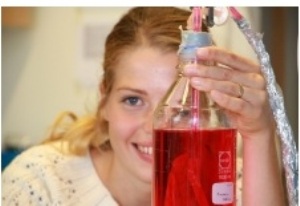The doctoral thesis submitted by Maria Jonstrup, a student in Biotechnology at the Lund University presents an eco-friendly purification process that can break down the hazardous chemicals utilized in the textile dying process and clear them before they are released out in agricultural lands or rivers. The presented purification process at the end releases only clean water.
 Maria Jonstrup, a doctoral student in Biotechnology at Lund University, Sweden. Credit: Lund University
Maria Jonstrup, a doctoral student in Biotechnology at Lund University, Sweden. Credit: Lund University
The research is presently at its early stages and the testing process is completed only at the laboratory level but Maria sounds positive about its potential outcome. According to her, the laboratory process will equally work well in real life conditions. She anticipates that the process will ultimately benefit the textile factories located in Bangladesh, China and India.
In her experimental process she used both bacterial and fungal enzymes collected from the municipal wastewater treatment plants and textile industry drains. She achieved a breakthrough when she combined a chemical and a biological purification process. According to her, the microorganisms utilized in the process broke down the textile chemical dyes in a reactor used for the purpose and for purifying the water she utilized small quantities of hydrogen peroxide and iron along with a UV light to split even the hardest structures. Though the combination of chemical and biological purification process were attempted early they proved to be ineffective in containing the release of hazardous chemicals.
The technique developed by Maria will be further tested in larger volumes of water reflecting the actual conditions of textile factories by two students under the supervision of Maria. The research will be engaged in finding ways to substitute UV light with normal sun light for further testing under live conditions.